Peter Adkison, who owned Wizards of the Coast until it was sold to Hasbro in 1999, oversaw the relaunch of Dungeons & Dragons with D&D 3rd Edition. Today, he commented on this week's round of Hasbro layoffs, which have ripped through WotC. Adkison left WotC in 2000 and currently runs a production company called Hostile Work Environment.
Like many of you, I'm saddened to learn about the layoffs at Hasbro.
Caveat: I have no idea of what’s happening behind the scenes at WotC. If you’re asking who’s at fault, or to what extent it was or was not justified, that’s outside the scope of my knowledge. This post is about my own reflections.
When I read about the layoffs at Hasbro my immediate feeling was shame. Shame for when I did the same thing, at the same company (WotC, before we sold it to Hasbro).
I have made lots of mistakes, tons of them, more than I can even remember. And while I regret those mistakes, and I’m sad for those hurt, I realize it’s part of learning and it’s part of being human.
But layoffs, when handed poorly, or when they are unnecessary, aren’t just mistakes. They are failings of character. Those times when I had a failure of character, those are the moments that haunt me.
Caveat: I have no idea of what’s happening behind the scenes at WotC. If you’re asking who’s at fault, or to what extent it was or was not justified, that’s outside the scope of my knowledge. This post is about my own reflections.
When I read about the layoffs at Hasbro my immediate feeling was shame. Shame for when I did the same thing, at the same company (WotC, before we sold it to Hasbro).
I have made lots of mistakes, tons of them, more than I can even remember. And while I regret those mistakes, and I’m sad for those hurt, I realize it’s part of learning and it’s part of being human.
But layoffs, when handed poorly, or when they are unnecessary, aren’t just mistakes. They are failings of character. Those times when I had a failure of character, those are the moments that haunt me.





